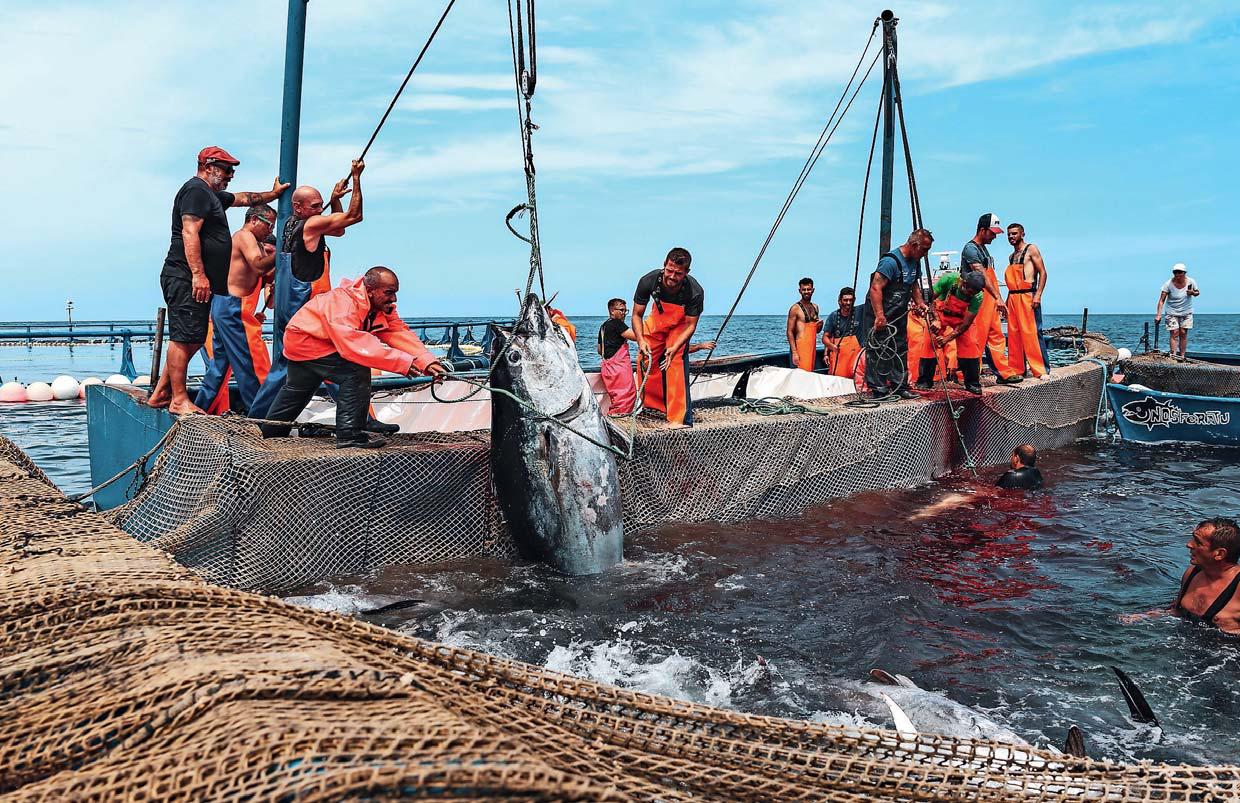Versuchen GOLD - Frei
Traditional fishers in Italy fight for right to catch tuna
The Guardian Weekly
|February 23, 2024
Tonnare and their ancient practices face extinction as a few big fleets hold the lion's share of quotas and permits

On an overcast morning, several kilometres off the east coast of Sardinia, four men jump into a net where 49 giant Atlantic bluefin tuna are fighting for their lives.
For more than 30 minutes, the men struggle in a frenzy of nets, tails, fins and sleek silvery bodies before finally securing a metal hook through the gills of the nearest fish. From one of the seven wooden boats that frame this càmira dâ morti ("chamber of death"), Luigi Biggio yells for his men to pull.
As 28 men look on, a majestic creature about three metres long, weighing 120kg is raised out of the water with a pulley. On the biggest boat, one man swiftly cuts its jugular and the vessel fills with blood.
Biggio, 57, runs a tonnara, the Italian version of an ancient Mediterranean fishing custom, which traps and harvests bluefin tuna in the gruesome struggle known in Italy as the mattanza (or "killing"). Biggio comes from a long line of rais (from the Arabic for chief), almost sacred leaders of the hunt - a mantle passed down from father to son in designated families.
"We carry on a tradition that's thousands of years old," Biggio says. "We continue it with pride."
The harvest is violent and can seem barbaric, as the dying tuna are hooked with a gaff, stabbed and hoisted on to boats. However, fishing experts regard it as a rare sustainable method of catching bluefin tuna, one of the world's most overfished species.
Despite its merits, Italy's tonnare face extinction. But they are not disappearing because of a lack of fish. While the practice was threatened in the early 2000s by a collapse in tuna populations due to commercial overfishing, EU regulations have helped recover these numbers over the past decade. But Italy's small-scale and traditional fishers have largely failed to secure permits under successive governments since the start of the quota system, and are now struggling to compete with big fleets.
Diese Geschichte stammt aus der February 23, 2024-Ausgabe von The Guardian Weekly.
Abonnieren Sie Magzter GOLD, um auf Tausende kuratierter Premium-Geschichten und über 9.000 Zeitschriften und Zeitungen zuzugreifen.
Sie sind bereits Abonnent? Anmelden
WEITERE GESCHICHTEN VON The Guardian Weekly

The Guardian Weekly
ASSAULT ON THE SMITHSONIAN
Donald Trump has vowed to kill off 'woke' culture in his second term, and a major institution a few blocks from the White House is in his sights
16 mins
January 16, 2026

The Guardian Weekly
'Add blood, forced smile' How Grok's nudification AI tool went viral
A trend for the chatbot to alter pictures to show women in bikinis spiralled into hundreds of thousands of requests to create fake sexualised images, horrifying those targeted
5 mins
January 16, 2026
The Guardian Weekly
Two horrifying truths have been disclosed by a lying president
For a serial liar, Donald Trump can be bracingly honest. We've known about the mendacity for years - consider the 30,573 documented falsehoods from the president's first term, culminating in the big lie, his claim to have won the 2020 election - but the examples of bracing candour are fresher. Last week both began and ended with the US president speaking the shocking truth.
4 mins
January 16, 2026

The Guardian Weekly
Jude Law's Putin sent from Russia with love
Is a new film portrayal of the autocrat as a James Bond-like strategist merely swallowing Kremlin myths?
3 mins
January 16, 2026
The Guardian Weekly
The city of noodles fights for the crown
The road to ramen paradise ends in the unlikeliest of places. At Men Endo, located in a suburban street, next to a school and a low-rise apartment block, bowls of noodles disappear in a flurry of slurps, gulps and hurried but heartfelt exchanges of appreciation between customers and chefs.
3 mins
January 16, 2026
The Guardian Weekly
Rhetoric risks repeating Warsaw Pact mistakes
Donald Trump's echoing of Russia's talking points in its war against Ukraine has long been a cause for alarm and dismay in the west.
2 mins
January 16, 2026

The Guardian Weekly
Europe's options What can the EU do to counter Trump's designs on Greenland?
Diplomacy and Arctic security European governments, led by Denmark's ambassador to the US, Jesper Møller Sørensen, and Greenland's envoy, Jacob Isbosethsen, have been lobbying US lawmakers to talk Trump out of his territorial ambitions for the island.
2 mins
January 16, 2026
The Guardian Weekly
China first? Carney looks to mend broken ties with Beijing
As trade war with Washington takes its toll, Canada’s PM seeks to restore fractured relationship with China
3 mins
January 16, 2026

The Guardian Weekly
As the bombs fell, my family planted hope in a garden in Gaza
My 12-year-old brother Mazen ran into the kitchen, shouting that the aubergines were sprouting. He held up the tiny green shoots, his hands shaking. My older brother Mohammed and I rushed outside, laughing despite the fear that had become our constant companion.
2 mins
January 16, 2026

The Guardian Weekly
Can Havana's bond with Venezuela survive Trump?
On Havana's Fifth Avenue, where the trees and lawns remain groomed even as the rest of Cuba wilts, a billboard outside the Venezuelan embassy reads: “Hasta Siempre Comandante” (Until For Ever, Commander) next to a vast picture of a smiling Hugo Chávez.
3 mins
January 16, 2026
Listen
Translate
Change font size

